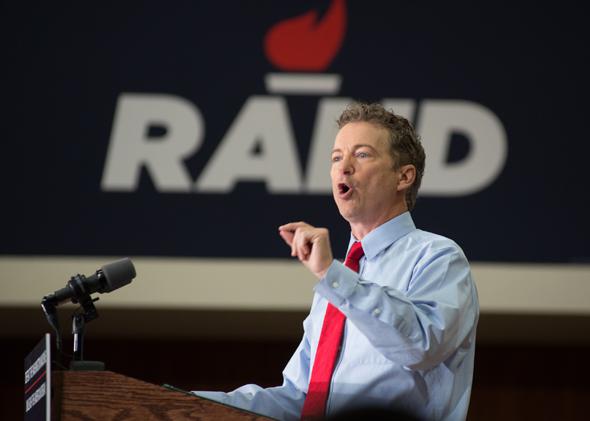IOWA CITY, Iowa—Rand Paul kicked off his first public appearance in the Hawkeye State since launching his anti-establishment presidential campaign with a question that was meant as a rallying cry. “Do we have any liberty lovers here?” he asked a crowd composed mostly of University of Iowa students, who sported Rand stickers and responded with cheers and whistles. But if Paul’s going to have any chance of contending for his party’s nomination, he better hope their nonlibertarian-leaning parents feel the same way.
The Iowa caucus will, of course, be the first major test for the entire GOP field—but the first-in-the-nation nominating contest is particularly important for Paul. The Kentucky senator’s campaign is predicated on the idea that he’ll be able to hold onto the libertarian-leaning bloc of voters who helped his father carve out a corner of the national stage in 2012, while at the same time layering upon that base enough converts from the more traditionally Republican masses to put him over the top. The Hawkeye State would appear to be particularly fertile ground for that strategy to take root. If it fails here, Paul will have a difficult time convincing anyone that it will work anywhere else.
In 2012, Ron Paul had one of his best showings of his entire campaign in Iowa, and much of that political infrastructure remains in place today. The elder Paul won 21 percent of the GOP caucus vote, enough to earn the libertarian firebrand an unexpectedly close—if largely overshadowed—third-place finish behind Rick Santorum and eventual nominee Mitt Romney, both of whom bested the Texas congressman by only four points, or less than 4,000 votes apiece. It’s conceivable, then, that Rand Paul will find himself among the caucus favorites come February 2016 simply by picking up where his father left off four years earlier.
But the family legacy isn’t without its disadvantages, and not only because Ron Paul supporters managed to burn a whole host of state GOP bridges over the past few years. Nominating contests—and early nominating contests in particular—are largely about how a candidate performs relative to expectations, and the expectations for Rand Paul will be high in Iowa, where the complicated and time-consuming caucus process lends particularly well to his brand of motivated supporters. Simply matching his father’s strong performance won’t be enough for a candidate who has promised to transform himself from a conservative gadfly into a legitimate contender.
If Paul can’t add a sizeable chunk of establishment or evangelical voters to his libertarian-leaning coalition in Iowa, there will be little reason to believe he’ll be able to do so in other states where he won’t have the luxury of a robust foundation on top of which he can build. Worse still, if he falls short of Ron Paul’s mark, it will mean that not only was he unable to add to the coalition his father assembled, but that he wasn’t even able to preserve it. By trying to be all things to all GOP voters, he’ll have effectively become nothing to everyone.
Already there are signs that could happen in Iowa.
Paul’s efforts to attract social conservatives and foreign policy establishment types have only just begun, and already there are grumblings among Ron Paul’s true believers that the younger Paul is selling out. An internal poll conducted in February of the elder Paul’s delegates to the 2012 Iowa GOP convention found that fewer than 70 percent of those delegates are leaning Rand Paul’s way in 2016. “He’s moderating on most of [his father’s positions], not taking a real clear stance on a number of them,” Drew Ivers, the chairman of Ron Paul’s 2012 Iowa campaign and one of a number of recent high-profile defections from Rand’s camp, complained to Politico last month. “The strategy of sending a blended message is one that has risk.”
It’s not all bad news for the Paul camp, however. In Iowa, he might not have to venture as far from his base as he may need to in other contests to be competitive. If everyone who is expected to seek the nomination does, the crowded field in Iowa could work to Paul’s advantage. Jeb Bush, Scott Walker, and Marco Rubio will have to fight it out for the support of the establishment Republicans who backed Romney in 2012, while Ted Cruz, Mike Huckabee, and Santorum will need to compete for the evangelical votes that delivered the caucus to Santorum in 2012 and Huckabee in 2008. If everything were to break right for Paul, he wouldn’t need to win a larger slice of the vote than his father to win the caucus. And if he pulls off a victory—something his father never managed to do on any primary or caucus night—it will be easy enough to overlook the raw numbers that delivered it.
Still, even there Paul faces a potential no-win situation in the long term. A libertarian-heavy campaign in Iowa might be enough to deliver him a caucus victory, but it won’t be enough to ultimately win the nomination—and by the time Iowans show up to caucus, there won’t be much time left for Paul or any other candidate to rebrand for the contests that will follow. The distance between now and the caucuses is further than between the caucuses and the GOP nomination. Rand Paul, then, faces a choice: He can focus on winning the battle in Iowa and know he’ll likely lose the nominating war. Or he can give up his best shot at an early nominating contest victory in hopes of future ones. We know Rand Paul’s determined to do better than his father. The question will come down to just how much better he wants to do.
